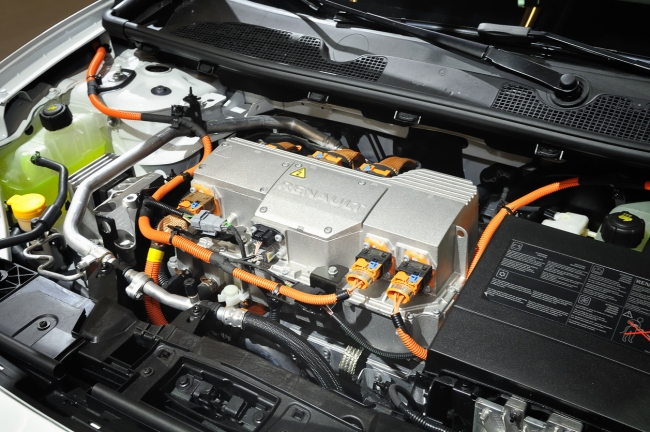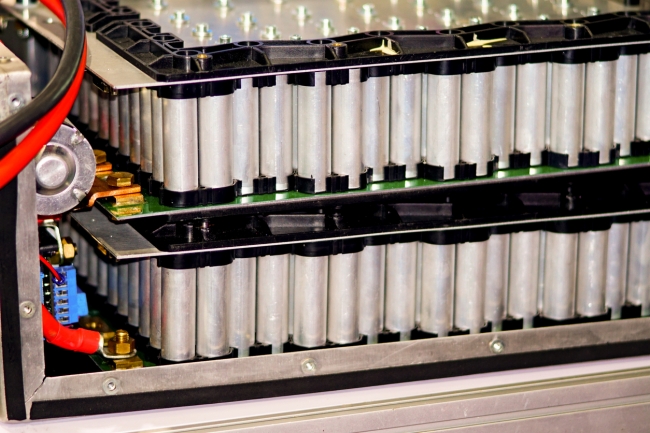4 minute read
£80m of funding to create new national battery facility announced
A partnership between WMG, at the University of Warwick; Coventry and Warwickshire Local Enterprise Partnership; and Coventry City Council has been awarded £80 million to establish a new National Battery Manufacturing Development Facility (NBMDF). The announcement was made by The Rt Hon Greg Clark, Secretary of State for Business, Energy and Industrial Strategy, while attending an energy conference on the University of Warwick campus.
The new national facility will be established in the Coventry and Warwickshire area by WMG, the Coventry and Warwickshire LEP and Coventry City Council and it will enable UK based companies and researchers to come together to build and maintain a world leading position in manufacturing technologies for batteries and their components in vehicles and transportation. It will provide a crucial new strategic link between the research, development and full-scale industrialisation for battery technologies across the UK.
It will enable effective partnerships between manufacturers, researchers, and economic development leaders, while remaining independent from commercial interests and will be governed with transparency.

Business Secretary, Greg Clark has announced £80 million of funding for a battery development facility to support manufacturing technologies for batteries and their components in vehicles and transportation / Picture: Getty/iStock
The facility will assist manufacturers and boost the future vehicle and transportation electrification industry by leading innovation, enabling the creation of products with performance ahead of international benchmarks speeding market entry, enabling rapid growth, and acting as a magnet for inward investment in the key technologies. It will also significantly scale up UK skills capacity in this area. Skilled employees are the critical resource for sustainable and competitive manufacturing of batteries in the UK and through the NBMDF a learning facility will be created to train the future skills base in all elements of battery manufacturing.
The new National Battery Manufacturing Development Facility will enable the development of the next generation of battery systems across battery chemistry, electrodes, cell design, module and pack levels. It will have a central location in the Coventry and Warwickshire area providing excellent transport links and is near to established automotive supply chains.
WMG has been working for 15 years with industry to develop and prove new battery technologies. More recently they have been working through the APC Spoke, the National Battery Scale Up facility and the Energy Research Accelerator. It has vast array of research projects already underway looking at everything from new battery technologies, how to scale up battery manufacturing and even a project exploring how to recycle and reuse such batteries.

The new NBMDF will be established in the Coventry and Warwickshire area / Picture: Getty/iStock
Professor Lord Bhattacharyya, Chairman of WMG said: “We are delighted to have been successful in the bid to create this new national battery facility here in the Midlands. Working with industry and the supply chain we will develop and expand battery R&D which will see the creation of skilled jobs and developments within the automotive sector.”
“Having a 37 year track record of working jointly with industry to innovate, and as leaders, for over 10 years, in battery development, WMG are poised to continue to drive forward battery innovation and help create growth and employment in the UK.”
“Coventry and the sub region has a significant contribution to make in the delivery of the UK’s national industrial strategy, being in a strong position to lead the advancement of battery development, and vehicle electrification and autonomous vehicles. It will be at the heart of the drive to make the city a smart motor city.”
Business and Energy Secretary, Greg Clark added: “Battery technology is one of the most game-changing forms of energy innovation and it is one of the cornerstones of our ambition, through the Industrial Strategy and the Faraday Challenge, to ensure that the UK leads the world, and reaps the economic benefits, in the global transition to a low carbon economy.
“The new facility, based in Coventry and Warwickshire, will propel the UK forward in this thriving area, bringing experts from academia and industry together to deliver innovation and R&D that will further enhance the West Midlands’ international reputation as a cluster of automotive excellence.”
Martin Yardley, chief executive of the Coventry and Warwickshire Local Enterprise Partnership (CWLEP), concluded: “We are obviously delighted to have been successful in our joint bid with WMG and Coventry City Council to create the National Battery Manufacturing Development Facility (NBMDF).
“This will be a centre which will lead and drive forward battery technologies, making alternative vehicle propulsion systems practical across a wide range of uses.
“We always believed with our globally-renowned pedigree in research and development, automotive and advanced engineering that we would be the perfect location to deliver such a cutting-edge project.
“Additionally, this is the perfect example of how the CWLEP working with totally united bodies in industry and academia can achieve very tangible results which are not only good for our region but also UK plc.”
The National Battery Manufacturing Development was part of the Government’s £246m Faraday Challenge and awarded through a competition led by the Advanced Propulsion Centre, supported by Innovate UK. It is also an initial element of the Government’s new Industrial Strategy. It also addresses the joined-up electrification agenda developed by the Automotive Council and the Advanced Propulsion Centre. It is a key element in leveraging the opportunities in electrification potentially worth £5-£50bn and driving significant jobs growth across the UK.